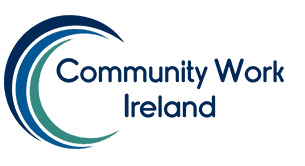Community Work is “a developmental activity comprised of both a task and a process. The task is social change to achieve equality, social justice and human rights, and the process is the application of principles of participation, empowerment and collective decision making in a structured and co-ordinated way” (All Ireland Standards for Community Work).
The values of community work as set out in the All Ireland Standards for Community Work are:
Collectivity
What is collectivity?
Community work is about working for collective change for communities. Its focus is on change in policy and practice which should lead to greater inclusion, equality and rights for marginalised communities and individuals.
What does this mean in practice?
Taking a collective approach means that community workers support communities to:
- Analyse their situations and set out a vision and strategy for change;
- Build solidarity, organise and take action for change;
- Identify and seek to remove barriers to participation;
- Act together to address inequality and injustice;
- Work to ensure that communities are supported and resourced in their collective work for equality and rights.
Read/watch more
Aaron Schutz and Marie Sandy (2011) Collective Action for Social Change visit: https://www.researchgate.net/publication/309413694_Collective_Action_for_Social_Change_An_Introduction_to_Community_Organizing
‘What is Collective Action?’ by Amnesty International
An Irish Example: Collective action to secure a legislative ban on fracking
Community empowerment
What is community empowerment?
Community empowerment leads people and communities to be resilient, organised, included and influential.
What does this mean in practice?
An empowering approach means that community workers support communities to:
- Define [for] themselves, their priorities and agendas for action;
- Be consulted, involved and participate in decision-making processes that affect their lives;
- Develop increased confidence and capacity to engage in dialogue, debate discussion and collective action for change
Read/watch more
World Health Organisation on community empowerment: https://www.who.int/teams/health-promotion/enhanced-wellbeing/seventh-global-conference/community-empowerment
CARE community empowerment manual: http://www.unscn.org/layout/modules/resources/files/Participation_for_empowerment_Manual.pdf
Pave Point ‘respect works’ video:
Social justice and sustainable development
What is Social justice and sustainable development?
At its core community work is about promoting a just society. This means that community workers are active in challenging injustice, poverty, inequality, discrimination and social exclusion. It means that community workers promote and value diversity and find ways of ensuring that all members of the community in which they work are recognised, included and valued. Promoting a sustainable society involves promoting environmentally, economically and socially sustainable policies and practices.
What does this mean in practice?
Working for social justice and sustainable development, community workers support communities to:
- Advocate collectively for their rights using all legal and policy mechanisms available to them;
- Challenge and address the unequal distribution of wealth, power and resources in society including between women and men;
- Have a voice in sustainable development policy and planning.
Read/watch more
Environmental justice defined at the Atlas of Environmental Justice: http://www.ejolt.org/2013/02/environmental-injustice/
A short video from the UN on Sustainable Development:
Human rights, equality and anti-discrimination
What is Human rights, equality and anti-discrimination?
Human rights are rights inherent to all human beings, regardless of race, sex, nationality, ethnicity, language, religion, or any other status. Human rights include the right to life and liberty, freedom from slavery and torture, freedom of opinion and expression, the right to work and education, and many more.
Everyone is entitled to these rights, without discrimination.
Equality is about ensuring that every individual has an equal opportunity to make the most of their lives and talents.
It is also the belief that no one should have poorer life chances because of the way they were born, where they come from, what they believe, or whether they have a disability.
Equality recognises that historically certain groups of people with protected characteristics such as race, disability, sex and sexual orientation have experienced discrimination.
In seeking a society where human rights and equality are realised and discrimination is addressed, community development is reinforced by national and international human rights laws policies and standards for the protection and promotion of human rights for all.
What does this mean in practice?
Promoting human rights, equality and anti-discrimination involves supporting communities to:
- Challenge oppression, stereotyping and prejudice in all its forms;
- Have a voice in the development of human rights policies, laws and practices in their country;
- Be resourced and supported to advocate for their human rights;
- Promote the rights of women in all their diversity, and advance women’s rights as a core priority, including addressing violence against women and the under-representation of women in decision making;
- Promote the rights of marginalised groups including Travellers, Roma, minority ethnic groups, migrants, LGBTI people, older people and people with disabilities;
- Use all legal routes to promote equality and address discrimination.
Read/watch more
The Universal Declaration of human rights: https://www.un.org/en/universal-declaration-human-rights/
An introduction to the Human Rights Based Approach: https://unicef.studio.crasman.fi/pub/public/pdf/HRBA_manuaali_FINAL_pdf_small2.pdf
Information on the Irish Human Rights and Equality Commission: https://www.citizensinformation.ie/en/justice/law_and_rights/irish_human_rights_commission.html
Human rights for Travellers and Roma in Ireland: https://www.paveepoint.ie/bringing-human-rights-home/
Jim Ife (2009) Human rights from below: achieving human rights through community development: https://www.cambridge.org/core/books/human-rights-from-below/92BA7F435998DD57FBFF88505B9387BC
Participation
What is Participation?
Community work recognises that responses to the needs of marginalised communities cannot and will not be effective without the meaningful participation of those affected by them in their design and evaluation. Participation is rooted in the idea that communities can and should be facilitated to articulate their own needs, concerns and interests, to contribute to developing the best responses to these issues, ensuring the best outcomes for the community.
What does this mean in practice?
A participative approach involves promoting the rights of communities to:
- Be supported to establish and develop autonomous, participative groups and networks to promote and advance their rights;
- Be consulted, involved and participate meaningfully in decision-making processes that affect their lives;
- Be supported to gain the confidence and skills to articulate and represent their needs in an effective and inclusive manner.
Read/watch more
Resources from NEON, the New Economics Organisers Network: https://neweconomyorganisers.org/resources/
The Barefoot Collective Guides: https://www.barefootguide.org/
Seeds for Change resources: https://www.seedsforchange.org.uk/
Community participation in planning: https://www.youtube.com/watch?v=8xCrd-tqB48






